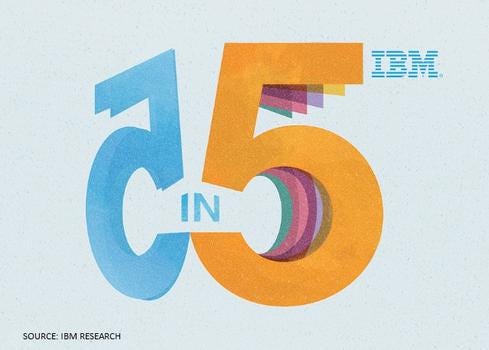Predixion Offers Free Analytics Software To UniversitiesPredixion Offers Free Analytics Software To Universities
Predictive analytics startup Predixion hopes to alleviate the data scientist shortage -- and boost its sales.


IBM Predicts Next 5 Life-Changing Tech Innovations
IBM Predicts Next 5 Life-Changing Tech Innovations (Click image for larger view.)
Predixion Software, a Southern California-based provider of predictive analytics tools, has officially launched a program to provide its software free of charge to universities around the world.
In a phone interview with InformationWeek, Predixion Software CEO Simon Arkell said the program has two main goals: To give students hands-on experience in using predictive analytics to develop data models, and to seed businesses with workers who are trained on -- or at least familiar with -- Predixion's software.
The software "is cloud-based, so it's readily accessible by anyone who has Excel and an Internet connection," said Arkell. "We're already being used by a number of universities, [where] students learn data mining and predictive analytics without having to be pure data scientists."
A small number of US schools, including the University of Washington, University of Western Michigan, St. Joseph University, and the University of Maryland University College, are already using the company's predictive analytics software, the company said.
[Looking to hire a data scientist? Read Traits That Make A Great Data Scientist.]
Predixion offers a limited, free version of its software to the general public, but its education edition goes a step further by providing all the training materials, labs, and other courseware that Predixion supplies to its paying clients.
The company's education program follows an established trend among big-data vendors intent on developing the next generation of data scientists and expanding their market presence.
IBM, for instance, is working with a select group of US universities to develop courses that provide analytics skills required for today's business environment. And database software provider Teradata offers a free, Web-based certification training program for university students interested in becoming a Teradata Certified Professional or Certified Associate.

Source: Wikimedia Commons
Predixion says its effort is designed to help alleviate the predicted shortage of data scientists. In additional to teaching data science skills, the company's software simplifies complex predictive analytics tasks, said Arkell, and allows a larger pool of business users to engage in data-science activities previously limited to a highly educated few.
"We've extracted the complexity away for those who don't need it," Arkell said. "Someone with a regular business analytical background can get up and running, and create value for themselves and their company very quickly."
More-technical users can dig deeper, however.
"We have the ability to drill down and go into the algorithm, if you like, for [experienced] data scientists," said Arkell. "But it's all automated and not needed if the user doesn't have that skill set."
Predixion's university program copies "a page from Apple's playbook," he added.
"They were giving Apple computers away 30 years old, very inexpensively, in order to get the next generation of computer users … and of course Apple has done extremely well," Arkell said. "We think it's a great idea because it will allow us to have thousands and thousands of students who end up going into the workforce and picking Predixion as their tool of choice."
He said it's easy for students to get started. "They download the software... and they're off and running very quickly. We provide to the university free-of-charge training materials, so that they can put together courses and coursework for their students," he said.
Arkell added, "We've not only taken away the complexity by allowing a much greater subset of users, potentially, to use this, [but also] by providing the free software and course works to the universities to grow whole new breeds of business analysts and predictive analysts."
Jeff Bertolucci is a technology journalist in Los Angeles who writes for Kiplinger's Personal Finance, The Saturday Evening Post, and InformationWeek.
You can use distributed databases without putting your company's crown jewels at risk. Here's how. Also in the Data Scatter issue of InformationWeek: A wild-card team member with a different skill set can help provide an outside perspective that might turn big data into business innovation. (Free registration required.)
About the Author
You May Also Like






